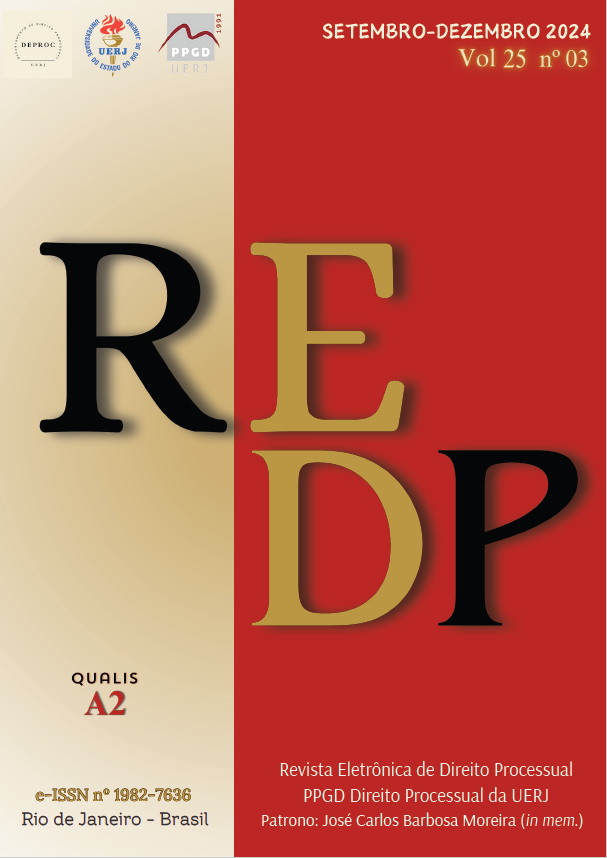ESTADO DE COISAS INCONSTITUCIONAL E A INVERSÃO DA POLÍTICA PELO DIREITO À LUZ DO FENÔMENO DA SUPREMOCRACIA
DOI:
https://doi.org/10.12957/redp.2024.86590Resumo
Este estudo apresenta como tema-problema a seguinte indagação: o Estado de Coisas Inconstitucional é um meio eficaz de tutela de direitos fundamentais ou representa mais uma faceta do ativismo judicial? Como hipótese, traçou-se a afirmativa de que não houve alteração da situação carcerária brasileira após o reconhecimento do ECI, servindo a decisão proferida na ADPF nº 347 apenas para instaurar a possibilidade de o Supremo Tribunal Federal exercer uma autêntica jurisdição fiscalizadora sobre os demais Poderes. À vista disso, o objetivo geral da pesquisa é analisar o ECI como uma nova vertente do ativismo judicial. Para tal, adotou-se como marco teórico o conceito de supremocracia de Oscar Vilhena Vieira. Ao final, o estudo conclui que a adoção da teoria colombiana pelo Supremo possui nítido caráter ativista, além de ser uma alternativa processual pouco eficaz de proteção de direitos fundamentais. Para este trabalho, utilizou-se de pesquisa bibliográfica e do raciocínio hipotético-dedutivo.
Downloads
Publicado
Como Citar
Edição
Seção
Licença
Copyright (c) 2024 Ana Luiza Goulart Peres Matos, Sérgio Henriques Zandona Freitas, Bruno Paiva Bernardes

Este trabalho está licenciado sob uma licença Creative Commons Attribution 4.0 International License.
Todos os artigos publicados na Revista Eletrônica de Direito Processual (REDP) (Departamento de Direito Processual, Universidade do Estado do Rio de Janeiro, Brasil) são licenciados por meio de uma Licença Creative Commons - Atribuição 4.0 Internacional (CC BY 4.0).
Os autores retêm os direitos autorais de seu artigo e concordam em licenciar seu trabalho com a licença CC BY 4.0, aceitando assim os termos e condições específicos desta licença disponíveis no seguinte website: https://creativecommons.org/licenses/by/4.0/legalcode.
- Os autores concedem à REDP o direito de primeira publicação, de se identificar como publicadora original do trabalho e concedem à revista uma licença de direitos não exclusivos para utilizar o trabalho das seguintes formas: Reproduzir, vender e distribuir cópias eletrônicas ou impressas do manuscrito como um todo, de partes específicas do manuscrito e de suas traduções para qualquer idioma;
- O uso do artigo por terceiros é livre, contanto que a integridade da publicação seja mantida e seus autores originais, periódico de primeira publicação e detalhes de citação sejam identificados.
Dentro dos termos da licença, os autores podem entrar em acordos contratuais adicionais separados para a distribuição não exclusiva da versão publicada do trabalho na revista.
Copyright and Licensing
All articles published in the Procedural Law Electronic Review (REDP) (Department of Procedural Law, State University of Rio de Janeiro, Brazil) are licensed under a Creative Commons License - Attribution 4.0 International (CC BY 4.0).
- Authors retain copyright to their article and agree to license their work under the CC BY 4.0 license, thereby accepting the specific terms and conditions of this license available at the following website: https://creativecommons.org/licenses/by/4.0/ legal code.
- Authors grant REDP the right of first publication, to identify itself as the original publisher of the work, and grant the journal a non-exclusive license to use the work in the following ways: Reproduce, sell and distribute electronic or printed copies of the manuscript as a whole, of specific parts of the manuscript and its translations into any language;
- Use of the article by third parties is free, as long as the integrity of the publication is maintained and its original authors, first publication journal, and citation details are identified.
Within the terms of the license, authors may enter into separate additional contractual agreements for the non-exclusive distribution of the published version of the work in the journal.




